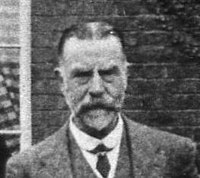This article needs additional citations for verification. (June 2018) |
William Arthur Dunkerley | |
|---|---|
 Dunkerley, c. 1910 | |
| Born | 12 November 1852 Manchester, Lancashire, England, UK |
| Died | 23 January 1941 (aged 88) Worthing, Sussex, England |
| Pen name | John Oxenham, Julian Ross |
| Occupation | Journalist, novelist, poet, publisher |
| Nationality | British |
| Period | 1892 to 1931 |
William Arthur Dunkerley (12 November 1852 – 23 January 1941) was an English journalist, novelist and poet. He was born in Manchester, spent a short time after his marriage in the US before moving to Ealing, West London, where he served as deacon and teacher at the Ealing Congregational Church from the 1880s. In 1922 he moved to Worthing in Sussex, where he became the town's mayor.[1]
Dunkerley wrote under his own name, and also as John Oxenham for his poetry, hymn-writing, and novels. His poetry includes Bees in Amber: A Little Book of Thoughtful Verse (1913), which became a bestseller. He also wrote the poem "Greatheart". In 1918, wrote the foreword and assessed the poetry of the administrator of the Scottish Women's Hospitals for Foreign Service, Mary H. J. Henderson In War and Peace: Songs of a Scotswoman.[2]
He used the pseudonym Julian Ross for journalism.
His novel A Mystery of the Underground (1897) is notable both as an early murder story about a serial killer and a very early crime story set on the London Underground (District Line).[3] The District Railway complained that it was "too realistic", and it is said to have led to a reduction of passengers on Tuesdays (the murderer always strikes on a Tuesday) while it was being serialised.[4][5]
In February 1892 Robert Barr and Dunkerley founded The Idler, a monthly "general interest magazine, one of the first to appear following the enthusiastic reception of The Strand, but not a slavish imitation". Barr and Dunkerley/Oxenham both contributed as writers. The editors were Barr and Jerome K. Jerome initially.[6]
Dunkerley had two sons and four daughters, of whom the eldest, and eldest child, Elsie Jeanette, became well known as a children's writer, particularly through her Abbey Series of girls' school stories. Another daughter, Erica, also used the Oxenham pen-name.
- ^ Oxenham, Erica J. O. and Scrapbook of J.O.
- ^ "POETRY - In War and Peace: Songs of a Scotswoman". The Scotsman. 27 May 1918.
- ^ FictionFan (2015-06-02). "Tuesday 'Tec! A Mystery of the Underground by John Oxenham". FictionFan's Book Reviews. Retrieved 2020-01-17.
- ^ Majumdar, Debabani (2013-01-10). "Love and hate for Victorian Tube". Retrieved 2020-01-17.
- ^ Hwang, Haewon (2013). London's Underground Spaces: Representing the Victorian City, 1840-1915. Edinburgh: Edinburgh University Press. ISBN 978-0748676071.
- ^ Cite error: The named reference
SFEwas invoked but never defined (see the help page).